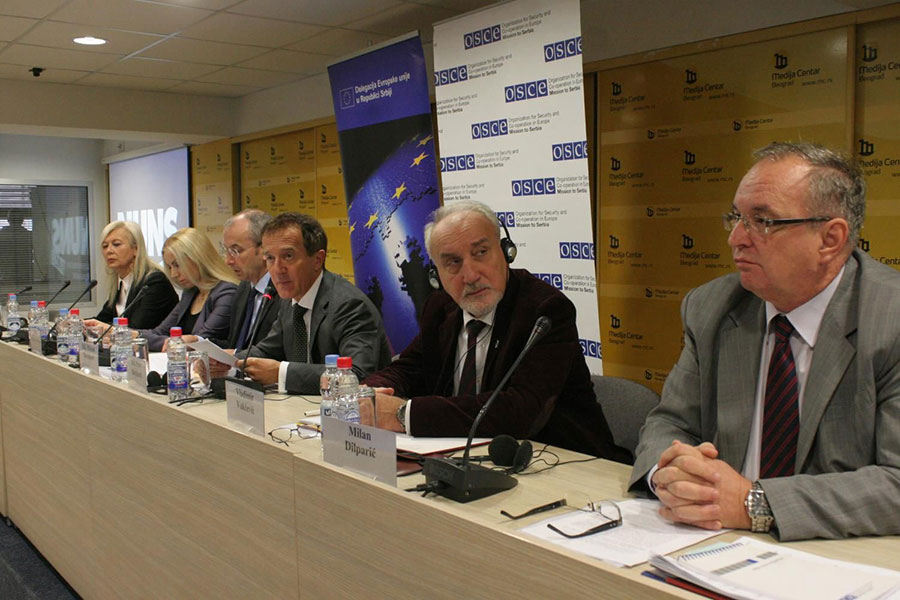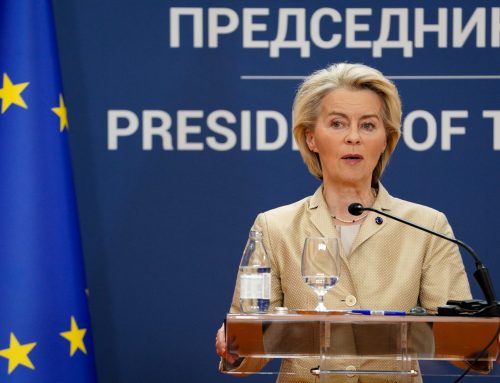Photo: FoNet
During the presentation of OSCE Report on War Crime Proceedings in Serbia from 2003 to 2014, Head of OSCE Mission in Serbia Peter Burkhardt said that in Serbia, by the end of 2014, 160 persons were prosecuted and 27 final judgements issued, convicting 73 persons.
“It shows poor quality of trials and difficulties faced by justice system,” said Burkhardt at the session in Belgrade.
In its Report, OSCE mentions inadequate implementation of regulations, case-law inconsistency and breaching of fair trial principle. Burkhardt also said that the justice lacked independence and suffered obvious political pressures, while war crimes prosecution had no political and public support.
He said that Serbian authorities’ major issue was having difficulties in obtaining evidence which was dependent on international cooperation and relied on witnesses.
“Since 2010 there is a decrease in number of cases, with fewer victims, while prosecution effectively generates less than three investigations per year, Burkhardt said.
Serbian higher court judge Milan Dilparic argued that there were 214 indictments, final judgements convicting 65 and releasing 34 persons, whereas judgements convicting seven and releasing four persons more were not final yet.
He said that Prosecutor’s Office cancelled prosecution of 48 persons, whereas prosecutions of 17 persons were suspended due to death. “People die, both perpetrators and witnesses, and this poses the biggest threat, the time is slipping through our fingers,” the judge warned and added that proceedings for 118 persons were put on hold, meaning that they had been launched, but then suspended because suspects were included in wanted circulars of other countries.
Dilparic also said that OSCE Report had wrongly claimed that Serbia failed to extradite war crime suspects to Montenegro, because, as he put it, he himself extradite several of them.
War Crimes Prosecutor Vladimir Vukcevic said that throughout OSCE Report the attention was constantly drawn to state of that particular Prosecutor’s Office and Court state and their fragility, “due to constant attacks of executive authority and political pressures on their independence and autonomy.”
“War crimes proceedings left no one in Serbia indifferent, neither perpetrators, victims and their families nor expert and general public,” Vukcevic said and added that OSCE played the most important role in connecting and facilitating cooperation among prosecutors’ offices of countries in the region.
Speaking about Report’s criticism towards the decreasing number of proceedings in recent years, that is, launching of a new case every three years, Vukcevic said that this was true statistically speaking, but not in essence.
“We have experienced issues after we had transitioned to prosecutorial investigation, but statistics may be very deceiving; it is not the same thing launching a case involving one or two victims, and launching a case such as Srebrenica, involving 300 of them,” said Vukcevic.
He wished no to comment on investigation of the plight of Bitici brothers, noting only that it was a case in progress.
Head of EU Delegation in Belgrade Michael Davenport said that one of the challenges of EU accession countries, was the issue of dealing with heritage of armed conflicts during the 1990’s and systemic breach of human rights.
Davenport said it took clear political will and engagement of institutional capacity, as well as clear support of society as whole in order to make progress in war crimes proceedings.
“Processing crimes in Balkans is the right way of respecting rights of victims and their families as well as ensuring reconciliation in the region,” Ambassador Davenport said and added that previous period brought increased level of cooperation among courts and prosecutors’ offices of countries in the region.
The issue of justice and judiciary remains “high on the EU agenda,” Davenport said and reminded that the Chapter 23 was among the first to be opened.




